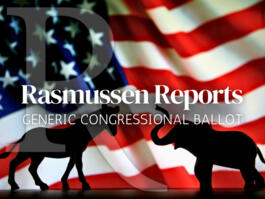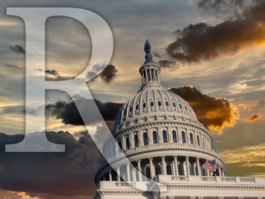Democrats 2016: After Months of Struggles, Clinton Helps Herself at Debate
A Commentary By By Larry J. Sabato, Kyle Kondik and Geoffrey Skelley
Last year at this time, Democrats were in the final month of their losing battle to hold the U.S. Senate. But while licking their wounds after the election, they consoled themselves with a 2016 comeback vision. Democrats already had a candidate so credentialed she was likely to sweep to the nomination and be in a solid position to bury the eventual GOP nominee. Demographics and destiny were on Hillary Clinton’s side, and she’d help the party recapture the Senate too.
What a difference a year makes. It’s hard to recall much of anything that has gone Clinton’s way in 2015. She has four opponents but has run mainly against herself — yet steadily lost ground.
The email scandal, which she mismanaged so badly it was political malpractice, is a big part of it but not the whole story. Then there is the lackadaisical campaign she ran for months — scripted, sanitized, and sterile. Clinton was bubble-wrapped, and she avoided pesky reporters and chose prescreened voters for her personal interactions. Never a natural campaigner like her husband, Clinton became as uninspiring and packaged as Robert Redford ended up being in the classic 1972 film, The Candidate. (He won, though.)
Even worse, Clinton has been dogged by the non-maybe-proto candidacy of Vice President Joe Biden. The tragic death of his son Beau produced not just a wave of sympathy but a complete reevaluation of a gaffe-prone politician often not taken seriously. As Hillary appeared less electable, Biden loomed ever larger — the perfect substitute just out of reach. If Biden finally jumps in, his image will surely blemish again because politics takes a terrible toll on every participant. For now, though, Clinton is competing with a ghost, and the ghost is winning in some ways.
Lately, Clinton has accepted reality and changed directions. Press interviews are plentiful, more open town halls are on the schedule, and appearances on late-night comedy programs show some sparks of Hillary humor.
Clinton’s numbers have declined over the last several months in part because she has been trapped in a recurring cycle of bad news. The falling poll numbers are a story. So are the private emails. And the Bernie Sanders surge and Biden’s shadow candidacy. Reasonable minds can disagree about whether she deserves a break, but she’s probably about to get one:
Clinton was a clear winner in Tuesday night’s debate and likely will be covered as one.
Debates can generate a roller-coaster effect; ask this year’s Republicans. Debates can also solidify the existing hierarchy. That’s what we saw last night.
Clinton’s deep experience in debates shone brightly. She was better than at any joint forum in her previous campaign. Clinton went into the debate the frontrunner and she came out exactly the same — probably strengthened in that role.
The former secretary of state’s debate night was thematically about President Obama and her gender. Time and time again, Clinton connected herself with Obama, cozying up to a politician who remains very popular among base Democrats. She even avoided criticizing Obama when asked if she would be “Obama’s third term,” saying she would want to build on Obama’s successes. It was an interesting twist for Clinton, who recently broke with the administration on the Trans-Pacific Partnership trade deal. But she more than any person on stage was resoundingly positive about the incumbent.
She also regularly brought up the history-making potential of her candidacy to perhaps become the first woman president. For example, when pressed on a question about Social Security, Clinton said she wanted to “enhance” the program to help poorer individuals, particularly single women who may have been widowed and had never had large salaries. Clinton’s gender was not as much of a central point of her 2008 campaign, perhaps in part because Obama’s candidacy had an even more dramatic historical dimension. But this time around, she’s proudly emphasizing it.
Sanders went in as the chief challenger and he came out the same — maybe even strengthened. His courage of conviction was steely; the most liberal Democrats were thrilled.
He showed that it’s too late to reverse the changes wrought in the Democratic contest during Clinton’s decline. Sanders, the most unlikely of challengers, has zoomed ahead of Clinton in New Hampshire and is in striking distance in Iowa. Sanders is moving up in plenty of other states, including California — though early polls in late-voting states (the Golden State primary is June 7) are especially useless. Still, his blunt talk about income inequality has struck a nerve with Democrats of many stripes.
Sanders clearly understood the need to make inroads with nonwhite voters, specifically citing black and Latino incarceration figures to stress the need for changes in the criminal justice system, as well as later arguing that institutional racism remains a serious problem in the United States. He was unabashed about his strongly progressive views, including a defense of the label “democratic socialist” — a move that must have made Clinton smile given what the polling says about that term. Overall, Sanders came across as genuine, which is both a good and bad thing for the sometimes irascible Vermont senator. His appeal to the party’s left was there — whether he can build on that is the challenge he faces.
There are also three other Democratic candidates: former Maryland Gov. Martin O’Malley, former Virginia U.S. Sen. Jim Webb, and former Rhode Island Gov. Lincoln Chafee. They all had decent, but not game-changing, moments. If anybody inched up, it was O’Malley. However, the trio has the satisfaction of proving Saturday Night Live wrong when they were called “the three mannequins from Jos. A. Banks.”
A fourth minor contender, Harvard Prof. Larry Lessig, did not qualify for the Democratic debate. Our updated rankings of the contenders are below in Table 1.
As the candidates move on from the first debate, Hillary Clinton remains the clear favorite for her party’s nomination — an argument we have made consistently. Clinton’s advantages (organization, massive support from party leaders and donors, and a unique chance to make history) are gigantic. This doesn’t make her absolutely unbeatable, but from the perspective of late 2015, Clinton still comes close.
If Clinton does lose, she will have squandered some of the biggest pluses any non-incumbent has had going into a modern nomination contest. Yes, she lost in 2008 despite a considerable early lead, but there is no Barack Obama in the 2016 field. Historically, one has to go back to U.S. Sen. Ed Muskie in 1972 to find a similarly favored Democrat who managed to muff his chances at the party nomination.
Meanwhile, If Joe Biden was looking for a reason from Tuesday night to run, he’ll have to find it elsewhere.
Table 1: 2016 Crystal Ball Democratic presidential rankings
| First Tier: The Undisputed Frontrunner | |||
| Candidate | Key Primary Advantages | Key Primary Disadvantages | |
|---|---|---|---|
 |
Hillary Clinton Ex-Secretary of State |
•Still stronger than she was eight years ago •Overwhelming support from party leaders, at least for now •Dual support from women, minorities hard to overcome, particularly after Iowa & New Hampshire |
•Danger signs in early states could snowball •Private e-mails, Clinton Foundation scandals still playing out •Has yet to prove she is a strong candidate who can build a solid campaign •Keeping Bill in check — and on the porch |
| The Wild Card | |||
 |
Joe Biden Vice President |
•Vast experience •VP bully pulpit •Fallback for party establishment if Clinton tanks |
•Gaffe machine •Party establishment with Clinton, at least for now •Hour growing late to build campaign operation, meet filing deadlines |
| Second Tier: The Leading Challenger |
|||
 |
Bernie Sanders Senator (Ind.), VT |
•New Hampshire lead, decent Iowa polling could help him get off to strong start •Small-donor fundraising strength •Drawing big crowds |
•Outsider in what is very much an insider process •Little appeal to nonwhite voters •Big crowds don’t predict wins |
| Third Tier: The Others | |||
 |
Martin O’Malley Ex-Governor, MD |
•Liberal record and policy achievements | •Baltimore baggage •Candidacy largely invisible so far |
 |
Jim Webb Ex-Senator, VA |
•Unique populist niche | •Invisible candidacy, not in line with base of party |
 |
Lincoln Chafee Ex-Governor, RI |
•Voted against Iraq war | •Left office very unpopular •No base of support in party, nationally unknown |
 |
Larry Lessig Harvard Law Professor |
•Emphasizing campaign finance reform, a big issue for some Democrats | •Those looking for a liberal protest candidate already have Sanders •Not prominent in Democratic Party |
Larry J. Sabato is the director of the Center for Politics at the University of Virginia.
Kyle Kondik is a Political Analyst at the Center for Politics at the University of Virginia.
Geoffrey Skelley is the Associate Editor at the Center for Politics at the University of Virginia.
See Other Political Commentary by Larry Sabato
See Other Political Commentary by Kyle Kondik
See Other Political Commentary by Geoffrey Skelley
See Other Political Commentary
Rasmussen Reports is a media company specializing in the collection, publication and distribution of public opinion information.
We conduct public opinion polls on a variety of topics to inform our audience on events in the news and other topics of interest. To ensure editorial control and independence, we pay for the polls ourselves and generate revenue through the sale of subscriptions, sponsorships, and advertising. Nightly polling on politics, business and lifestyle topics provides the content to update the Rasmussen Reports web site many times each day. If it's in the news, it's in our polls. Additionally, the data drives a daily update newsletter and various media outlets across the country.
Some information, including the Rasmussen Reports daily Presidential Tracking Poll and commentaries are available for free to the general public. Subscriptions are available for $4.95 a month or 34.95 a year that provide subscribers with exclusive access to more than 20 stories per week on upcoming elections, consumer confidence, and issues that affect us all. For those who are really into the numbers, Platinum Members can review demographic crosstabs and a full history of our data.
To learn more about our methodology, click here.



